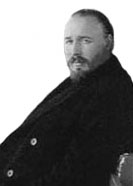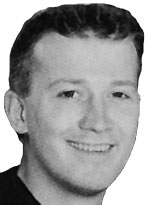>> Top Nine: Kennedy's Choice
>> Alphabetti Fumetti: V is for Vaughan
More...

 E is for Ellis, Warren
E is for Ellis, Warren
b. 1968, Rochford, England
1990: DEADLINE; 1996: STORMWATCH; 1997: TRANSMETROPOLITAN; 1999: PLANETARY
You're on the Magic Electric Internet, you're reading Ninth Art, you're probably well aware of Warren Ellis.
There aren't many creators who have (or have had) a net presence as influential as whisky-drinking amiable curmudgeon Warren Ellis - Brian Michael Bendis and Mark Millar maintain their own fan-harems, but Ellis is probably the one who's had the greatest impact online. There are doubtless little conclaves of internet trolls gathered across the world (in their mothers' basements, naturally) plotting their revenge on the man who cut them off in full flow with a perfunctory "Out you go". (NB: this may or may not have been appended by the word "shiteyes".)
Ellis started out his comics career with a brief DEADLINE strip before moving on to his own works such as the decadent cyberpunk story LAZARUS CHURCHYARD. The fact that he had such an early exposure to the creator-owned process may go some way to explaining his stance as an almost militant advocate of it in recent years. This didn't stop him from going to work for Marvel in 1994, though, as he took on horror title HELLSTORM and then DOOM 2099. In 1996, he took on STORMWATCH, the book that eventually became the insurance company's nightmare scenario, THE AUTHORITY.
The things that most people will be reminded of when they think of Ellis are his public disdain for superhero comics and his zero-tolerance policy of message board administration. In his one-time column for Comic Book Resources, Come In Alone, Ellis famously described the current situation in the US comics industry as being akin to a book industry where 90% of published novels were nurse romances.
It seems that Ellis is content to write a bit of love on the wards himself from time to time, as he has returned to Marvel and DC on several occasions - his Counter-X project, his current JLA CLASSIFIED story, his glacial IRON MAN series, his year-long run on ULTIMATE FANTASTIC FOUR and his ULTIMATE GALACTUS trilogy have all seen him penning men in tights.
He's also kept up his own projects in parallel, such as GLOBAL FREQUENCY, DESOLATION JONES and FELL. He also produced an 'imaginary fifth week event', Apparat, featuring first issues of ongoing series that were never intended to return - though they didn't successfully ship in the same 'fifth week', and a second attempt is planned.
Ellis has seen his visibility dip slightly in the wake of the closure of his Warren Ellis Forum, but that could all change with the recent launch of his new forum, The Engine. This enclave of pro and semi-pro comic book creators, with obligatory female moderators, has provoked both positive and negative responses from the online community, some saying it's too insular, others saying it's just what online comics discourse needs right now. Either way, Ellis remains someone whose persona and work continues to provoke discussion, which I'm sure is how he'd want it.
 E is for Englehart, Steve
E is for Englehart, Steve
b. 1947, Indianapolis
1971: VAMPIRELLA; 1983: COYOTE; 1992: ULTRAVERSE
If Brian Michael Bendis really wants a sobering experience, then he should look at Steve Englehart. Englehart is the classic example of a talented creator whose fall from favour saw him drop off the radar almost entirely, only to occasionally resurface in discussions of old superhero runs.
Englehart's pedigree is nothing to be sniffed at. Starting out as an inker on Neal Adams' VAMPIRELLA, he quickly realised that he'd find his metier more effectively if he set aside his brushes and sat down at a typewriter. His run on CAPTAIN AMERICA is well remembered, mainly for the Watergate-influenced story in which a barely-disguised Richard Nixon blows his own brains out in the Oval Office, prompting Cap to do his Man Without A Country shtick for the first time.
He followed that up with a run on AVENGERS, which introduced one of his pet characters, the Celestial Madonna, Mantis. These were seminal comics at the time, pushing what had been fairly formulaic characters into territory that was, for them, new and untested. Marvel Comics in the 1970s was effectively the House of Steve, as Englehart and Steve Gerber became more and more prolific. Englehart took on the writing chores on DEFENDERS, and the stories that he produced there are remembered firstly for being great superhero yarns, and secondly for being absolutely mental.
After falling out with Marvel in the late 1970s, Englehart went to DC to do the JUSTICE LEAGUE and BATMAN, but came back to Marvel to produce what was to become his signature series - the creator-owned COYOTE, originally published in ECLIPSE MAGAZINE. This was one of the first series from Marvel's much-lauded mature, creator-focused line, and gave the young Todd McFarlane an early shot at glory.
Englehart even created an entire superhero universe in 1992, the Malibu Ultraverse. After Marvel bought and shot dead the concept, Englehart seemed to almost vanish from comics. He wasn't the go-to guy any more, and when he did get his chances to work for the Big Two again, he has tended to produce retreads of his past glories (such as AVENGERS: CELESTIAL QUEST).
Most recently, he's returned to Batman with the miniseries DARK DETECTIVE, a sequel to his short 'Strange Apparitions' run on the character. Perhaps Englehart shot himself in the foot by declaring that these eight issues defined the modern Batman franchise - a credit most people would give to Frank Miller and Denny O'Neill - and that they formed the basis for the BATMAN movie (to which they do bear a cosmetic resemblance) and BATMAN: THE ANIMATED SERIES. Unfortunately, the DARK DETECTIVE series proved that Englehart's initial DETECTIVE COMICS run was very much a product of its time, and the end product has been disappointing.
Englehart now works mainly outside of comics, with several novels and computer games under his belt, and stands as a warning to today's hot creators: the comics industry can play favourites, but it can also forget you in a moment.
 E is for Ennis, Garth
E is for Ennis, Garth
b. 1970, Holywood, Northern Ireland
1989: TROUBLED SOULS; 1991: HELLBLAZER; 1995: PREACHER; 2000: PUNISHER
Are you a man? Like guns? Like stories about men and guns? Well, then you'll probably enjoy the works of Chuck Dixon and Larry Hama, men who like to write stories about men and guns.
If, on the other hand, you like stories about men and guns with added religion, male-bonding, gross disfigurement, and even more guns - but a bit more thoughtful, like - you'll probably enjoy the works of Garth Ennis.
Ennis is one of the most respected writers in comics today, largely because of his magnum opus, PREACHER. This was the series that elevated him beyond "that bloke from Northern Ireland who wrote that HELLBLAZER run where John gets cancer" to a creator with an appreciable oeuvre and identifiable voice. Ennis and his PREACHER art partner Steve Dillon produced 66 issues of Jesse Custer's quest for God, and in the process managed to create what was quite probably Vertigo's biggest critical success alongside SANDMAN. Of course, it wasn't just about religion - it was also about male-bonding, gross disfigurement and guns.
These are themes that crop up a lot in Ennis's work. Variations on the Arseface character have cropped up in FURY and GHOST RIDER, and his WAR STORIES one-shots for Vertigo, though generally superb, do tend to feel overly familiar.
Ennis's superhero work makes it clear that he believes that superheroes are, quite frankly, stupid. In PUNISHER he had Wolverine taken apart in the manner of a coyote in a Roadrunner cartoon, culminating with his being run over by a steamroller. THOR: VIKINGS sidelined its lead character in favour of men, guns, and all the usual gubbins - but with the addition of a brilliantly sarcastic Doctor Strange, who stole every scene he was in. At this point, it would probably be best if Ennis stayed away from superheroes and kept to stories about male-bonding, guns, gross disfigurement and religion, because we get the point by now; superheroes are stupid.
Ennis is currently working on THE AUTHORITY: THE MAGNIFICENT KEVIN with Carlos Ezquerra, which manages to be the only good thing published in recent memory with the word AUTHORITY on the cover. He continues to scribe PUNISHER for Marvel, in which he's been allowed to age the character and drop him into a world of realistic injury and brutality - and guns and gross disfigurement.

This article is Ideological Freeware. The author grants permission for its reproduction and redistribution by private individuals on condition that the author and source of the article are clearly shown, no charge is made, and the whole article is reproduced intact, including this notice.


